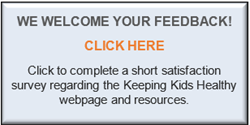

What We Learned
In the second and final year of the OPHA-led Keeping Kids Healthy through Collective Impact project, participating communities focused on developing and implementing local action plans, planning for their local evaluations, and transitioning local structures to position efforts for long-term sustainability. Please find below various reports, tools, and resources that resulted from this work. We are pleased to share our experiences from this project and would like to especially recognize the work of all the Leads and community partners who participated in the project and contributed to the lessons learned. Our hope is that other communities will be able to benefit from our experiences as well by adopting and building on the pieces shared below.
-
EVALUATION SUMMARY REPORT NEW
-
UNDERSTANDING CROSS-SECTOR PARTNERSHIPS: A PROVINCIAL SCAN
-
INVENTORY OF CASE STUDIES: CROSS-SECTOR PARTNERSHIPS
-
A TOOL TO DEVELOP CASE STUDIES TO STRENGTHEN CROSS-SECTOR PARTNERSHIPS
Webinar Recordings Available
Developing Cross-sector Partnerships: Facilitators, Strategies & Barriers
- See an abbreviated recording of our webinar showcasing the report’s findings check out OPHA’s video available here
- Access the webinar slides (without audio)
Leveraging Partnerships to Support System Change
-
See an abbreviated recording of our webinar showcasing the report’s findings check out OPHA’s video available here
- Access the webinar slides (without audio)
- Please find other resources mentioned during the webinar in sections listed below
Sharing Lessons Learned: Evaluation and Experiences
Review and Resources
Participating Keeping Kids Healthy through Collective Impact project communities included:
- The City of Peterborough
- The County of Middlesex
- The City of Ottawa
- The City of Thunder Bay
Working together with our project partners and each of the four partner communities, throughout year one of the this project we made progress on a number of fronts and are excited to share with you some of the resources that we have found useful along the way. Locally, each of the partner communities have generated exciting momentum from a broad range of partners related to health and social sectors and moved forward into the second year of the project tackling their action plans for system level change as a collective. Below are some of the tools, resources, and notes about our process that led into the development of local action plans and evaluation plans.
Local Community Workshops
In November/December 2018, each of the four partner communities held a local workshop as a platform to:
- Provide community leaders and community organizations opportunities to learn more about:
- The collective impact approach and processes
- How a range of personal, social, economic and environmental factors influence health, and how different sectors can come together to ensure that all community members have fair access to health and social services
- The project’s objectives and timeline
- Take stock of the health of children in their communities, and map local health and social services to determine where and how partnerships can be developed to enhance these services.
Tools and Resources from the Workshops
- Workshop presentations:
- Introduction to Collective Impact
- Health Equity
- One page intro to collective impact
- Health equity cheat sheet and toolkit
Situational Assessment
In January 2019, partner communities continued working on their situational assessments in order to address key questions about the systems that are in place in their communities and to inform the development of an action plan for system-level change. Some of their key questions included:
- What are the main or priority social/health issues impacting children and families in our community?
- What is our organizational, community or system-level capacity to address issues impacting children’s health and to work in partnership?
- What are the assets and what are the gaps in organizational, community and system-level capacity?
The situational assessment is an important component in preparing for action planning, as it will help to inform if/who/where people might be experiencing “slipping through the cracks” of the system in their communities. It will also help us to learn more about where opportunities exist to create linkages and strengthen connections within the system where those “cracks” might be.
Tools and Resources from the Situational Assessment
- Our Situational Assessment Guideline document was used to help steer the scope and data collection of the situational assessment in each of the communities
- Organizing/reflecting on the results of the situational assessment to inform action planning
- Toolkit on thinking about system change and collective impact
- A toolkit that can be used to engage families who have lived experience in supporting their children who are facing developmental challenges
Developing the Community Action Plans and Local Evaluation Plans
Throughout the spring of 2019, participating communities worked with local partners to build off of the common agenda they had arrived at in order to develop and implement a local action plan, as well as a local evaluation plan.
Templates Utilized for Developing Local Action Plans and Evaluation Plans
- Local Action Plan Adapted Template New
- Tips for Creating Evaluation Questions for Collective Impact Projects New

Photo credit: Myles Tan on Unsplash
About Keeping Kids Healthy through Collective Impact: Connecting Health and Social Sectors to Promote Healthy Equity
The Ontario Public Health Association (OPHA) launched an exciting new project in spring 2018 entitled Keeping Kids Healthy through Collective Impact: Connecting Health and Social Sectors to Promote Healthy Equity. This project is being funded as a result of being awarded a grant from the Ministry of Health and Long-term Care (MOHLTC), under the Health and Wellbeing Community Development Grant Program. The project is a two-year project and will continue until March 2020.
The Healthy Kids Community Challenge (HKCC) is a key part of Ontario’s Healthy Kids Strategy. While separate and distinct from the HKCC, this project builds on the work of the HKCC communities’ by completing a provincial scan to learn how they have networked and formed linkages that have created sustainable, successful partnerships and to share lessons learned.
HKCC communities have identified the value of including a broader range of health and social sectors (e.g., education, poverty reduction, housing) at their partnership tables. This project will apply learnings from HKCC to four selected communities to support and strengthen their capacity to build and expand their cross-sectoral linkages. This will enable more coordinated planning and services to support the optimal health and well-being of children, particularly those who are disproportionately impacted by the social determinants of health (SDOHs).
The four communities will be supported in identifying gaps and building linkages through the creation of local working tables who will participate in a collective impact approach with a broad range of community partners including health intermediaries (public health, primary care, mental health), social and community sector organizations (e.g., municipalities, housing, poverty, education, childcare, schools, social boys and girls clubs, etc.). Communities will identify existing partners, resources, opportunities, and gaps to address the complex issues impacting children related to SDOH. By creating a shared vision and locally driven action plan this project will promote collaboration, integrate services, build efficiencies, break down barriers across sectors and reduce duplication. Results will be disseminated broadly for continuous learning.
The Ontario Public Health Association & Project Partners, including:
- alPHa-OPHA Health Equity Work Group
- The Alliance for Healthier Communities
- The Association of Family Health Teams of Ontario
- Children’s Mental Health Ontario
- Ontario Municipal Social Services Association
- Public Health Ontario
- Eco-Ethonomics Inc.
- the former Propel Centre for Population Health Impact
If you are curious to learn more about the differences between this project and the Health Kids Community Challenge, please click here to download our summary comparison chart.
The Keeping Kids Healthy through Collective Impact Project is funded by the government of Ontario.

The views expressed in the publication are the views of the Recipient and do not necessarily reflect those of the Province.


